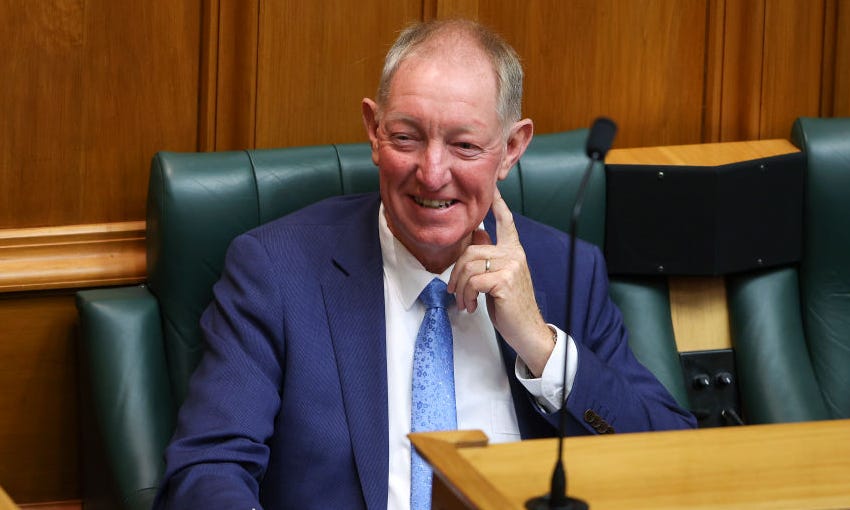Good morning and welcome to The Bulletin for Thursday June 10. I’m Stewart Sowman-Lund, once again filling in for Alex. Presented in partnership with Z Energy.
In today’s edition: Nick Smith returns to parliament, the Climate Change Commission challenges the government to act, and nurses take to the streets in the thousands.
(Image: Getty Images)
National MP Nick Smith is returning to parliament today, to formally end his 30 year political career. Smith will give his valedictory speech this afternoon, in the presence of the National caucus including leader Judith Collins. It’s almost two weeks since Smith announced he would be leaving parliament amid an inquiry into a “verbal altercation” that took place in his office. Of course, there was also that tip-off that a media story about him was going to break – something that never happened.
So, what do we know now about Smith’s resignation? The circumstances remain fairly sketchy, with Judith Collins still refusing to confirm or deny whether she is the one who gave Smith a heads up about the media story that never was. As Newsroom’s Jo Moir wrote earlier this week, there’s something of a contradiction in Collins’ statements about Smith. As Moir writes: “Collins denies she told Smith to leave while at the same time insisting she warns her MPs when she thinks a media storm is coming their way.”
Then there’s the role of Newshub’s Tova O’Brien in the whole thing. Allegedly, Smith thought it was O’Brien who had the mystery story about him. It makes sense, as Newshub are never far from a big political scoop. And yet, O’Brien said last week she never had a story on Smith in the works. Judith Collins has continued to maintain she does not disclose the contents of conversations she has with her MPs – a statement that is simply not true – and therefore will not reveal whether she did indeed tip-off Smith.
What’s going to be in that valedictory then? According to Newshub, not much. Or at least, not much if you were hoping for answers to the big questions surrounding Smith’s mystery resignation. Newshub understands his focus will be on his three decade long political career rather than how it all ended.
The Climate Change Commission has issued its final report on how to slash emissions. The Spinoff’s political editor Justin Giovannetti scrutinised the report so the rest of us don’t have to, and discovered that meeting New Zealand’s climate goals will be harder and more expensive than expected – but deep reductions are still affordable and achievable. The report found that the country had emitted far more emissions than expected in recent years. Commission chair Rod Carr said: “We just need to get on with it. Now.”
There’s been a bit of a mixed response to the report overall. Writing for The Spinoff, ecologist Mike Joy argues that there is a lack of urgency in the advice. Here’s some of of what he says:
This final advice suffers from the same issues as those in the draft advice, which led the group Lawyers for Climate Action to conclude that “the Commission appears to have focused on what is ‘achievable’ rather than first asking ‘What is necessary to contribute to limiting the global temperature increase to 1.5° Celsius?'”
It lacks the urgency required and again sets targets that are too weak and too late. The critical changes we all need to make – like reducing consumption of everything, especially energy, and avoiding waste – are a crucial omission.
Thousands of foreign workers have been handed a further lifeline from the government. Immigration minister Kris Faafoi announced this morning that 10,000 working holiday visas and seasonal work visas due to expire between June 21 and December 31 will be extended for another six months to help manage ongoing labour shortages caused by Covid-19. “This will provide employers with an assurance that they can continue to access the current onshore workforce to help fill roles,” says Faafoi. “It will also put the minds of visa holders at ease knowing they can stay and work in New Zealand for the foreseeable future.”
30,000 nurses took to the street yesterday for eight hours to protest working conditions and pay. As the Herald reports, protests in the capital ended up outside parliament where nurses addressed the health minister Andrew Little. "You are here because you care. I hear your message and we don't disagree," Little told the crowd. He was reportedly met with boos and jeers. "We are long overdue for a health system that looks after its workers and looks after its people, and a working environment where people can work safely,” he continued.
Following the protest, nurses are hoping negotiations can continue. According to RNZ, district health boards will be making plans today to resume pay talks.
The vaccine roll-out remains about 10% ahead of schedule. As I reported yesterday in the live updates, more than 750,000 doses of the vaccine have been given out so far. However, Covid-19 response minister Chris Hipkins warned that there will be some “unevenness” with the distribution of jabs to those in group three. He said people should not be worried if their friend in a different part of the country has already been vaccinated as part of group three, as DHBs would be starting that group at different times.
While the roll-out is running smoothly overall, the number of jabs given in Auckland is lagging. As the Herald notes, Auckland is running at 90% of its target delivery – about 30,000 doses behind where it should be. Hipkins said the government will keep a close eye on it and added: "I don't have any particular concerns at this point".
Meanwhile, three recent arrivals from Sydney will spend the next two weeks in an Auckland MIQ facility after violating New Zealand’s travel pause with Melbourne. According to minister Chris Hipkins, the three who are “normally resident of Australia” drove from Melbourne to Sydney and hopped on a quarantine-free flight to Auckland. On arrival, they misled border officers but were detained when something in their story caught the attention of officials. They were identified as having travelled from Victoria, violating Australia’s stay-at-home order, and were moved to nearby managed-isolation. They’ll face a $3,100 bill each for their stays.
A Covid-positive patient has been transferred from the Jet Park quarantine facility to Auckland’s Middlemore Hospital. The individual is in a “moderate but stable” condition. A spokesperson for the Counties-Manukau DHB said: “We are well equipped to deal with Covid patients and have robust processes in place to manage their admission.”
Whether you're reading The Bulletin as you prepare for your daily commute, as soon as you get to the office, or while you're en route, chances are you've probably got some thoughts about congestion and how our transport infrastructure works in Aotearoa. The New Zealand Infrastructure Commission is seeking submissions now on for a 30-year infrastructure strategy – if you think we could be doing better, click here to have your say.
Labour MP Phil Twyford has returned a donation after a Newsroom investigation found the donor believed the March 15 terror attacks were a Jewish conspiracy. Twyford accepted the $2000 donation 12 days before last year’s election from Ahmed Bhamji. He had claimed the gunman behind the Christchurch massacre was funded by the Israeli intelligence agency Mossad and “Zionist business”. Twyford was unaware of the donation when approached by Newsroom, but said he had returned it “in order to avoid any confusion about my position”.
A bit of feedback from yesterday’s Bulletin. Ben wrote in about Donna Chisholm’s excellent article on rest home rules. He said:
An important issue that was not covered is the availability of places for people who do not have capital. A couple of years ago I remember the Arvida boss saying that they were changing their mix of beds to 70% premium (as in need to pay more than the government subsidy) up a long way from the current level (I don’t recall what it was exactly). What is developing is a seriously two tier system where those with money buy into the villages whilst they are well on the promise of access to good care in a hospital or dementia unit attached to their village. Whilst the system is in an expansion phase there are still places available at the government subsidy but when the villages fill up those will disappear; patients in hospital will be at the end of a queue that is filled up by the residents of the apartments.
Got some feedback about The Bulletin, or anything in the news?
Get in touch with me at stewart@thespinoff.co.nz
Right now on The Spinoff: Mirjam Guesgen looks at the side effects of the Covid-19 vaccine and explains why they are no cause for concern. Ecologist Mike Joy says he was disappointed by the Climate Commission’s big report released yesterday. Sam Brooks reviews the latest TV show set in the MCU: Loki. There’s a couple of new podcasts too: Conversations That Count – Ngā Kōrero Whai Take looks at how our oceans are being affected by climate change. And comedian Chris Parker is this week’s guest on FIRST.
For a feature today, another look at yesterday’s nurse strike. Jill Mortimer from the NZ Nurses Organisation gave a harrowing glimpse into the life of an overworked health worker during her address to 1400 protestors in Whangārei. Here’s an extract from her speech, as reported by the Northern Advocate:
You go to work on a shift - you don't want to because you know it's going to be overwhelming and soon as you arrive, it's all on.
One nurse might be assigned five patients; one needs life-saving treatment, which becomes the priority, two will be in significant and severe pain but you can't get to them. There will be a kid with a fever who needs (medication) to bring the fever down and a dementia patient needing the toilet and it is unsafe to get up unassisted.
They end up wetting the bed and we absolutely hate that - not only because it's disgusting but because it's about their dignity. Also, it puts them at risk of skin damage.
If you lose a patient, of course, you carry on. This has a significant effect but you have to move onto the next patient when you feel you haven't had the time to address that properly. That's just soul-destroying and really affects your psyche.
How do you go home from that? You go home just broken and there's no time to care for yourself; You finish your shift at 11pm, have a handover, reflect on the drive home, make yourself a cup of coffee and sit down and reflect some more.
Then you might flick on the telly to wind down and you go to bed but you can't go to sleep because you're dwelling on what you should have done for that patient.
That's it for The Bulletin. If you want to support the work we do at The Spinoff, please check out our membership programme.






